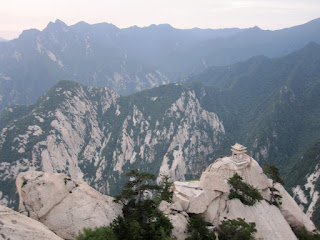
The train ride back from Xi'an was a delight. We had splurged on "soft sleeper" seats, which had only four beds (as opposed to six) which were bigger and more comfortable. Yu Yun had mistakenly put us different cabins and it turned out that she got the boring one (explained in a moment). She tried to switch with the odd, quiet woman in the bunk above mine, but she didn't want to move.
If she had had any foresight she certainly would have wanted to, because opposite us was a family with two young boys, sharing two bunks with mom and granddad. All evening they were climbing over the bunks, playing under the blankets, jumping from one side to the other, and at certain times escaping into hall with mother and grandpa in hot pursuit. The youngest (about 3) capriciously kept demanding to be moved from the top bunk to the lower one and even sometimes venturing over to mine, but that was only when he wasn't chasing after his brother or looking for ghosts out the window. His "Ge Ge" (older brother) enjoyed playing with him for intervals of about 10 minutes. Then he would get tired and start fighting with him over something, at which point mom would intercede and he would cry about how she loved "Di Di" more than him. It occurred to me that this interplay was something I hadn't seen much of in China, and there's a good reason why.
Because of the one child policy, parents are not supposed to have more than one son. In rural families, if the first child is a girl, then they may have a second child, and there are other exceptions, including a fine for "breaking" the rules. Yu Yun talked with the mother and found out that they were from Jiangsu province, but the oldest was attending school in Beijing (to ensure he learns proper Mandarin) which confirmed that the family was probably pretty well-off. So if they didn't already have connections with the powers that be, they could probably handle the fines. But most of the young people I know, including the students I teach, are only-children, or just have sisters (ewwww, sisters :)) so a big or little brother is an uncommon sight.
I couldn't help but wonder how this changers Chinese society. You might think I am being biased as a (lousy) older brother myself, but I think it's just as critical as any other relationship within the family. Each kind of sibling bond, whether sister-sister, brother-brother, or sister-brother, is important because they help shape our personalities. But what is a society that has few older brothers? Or few younger sisters? Or any siblings at all? I am not going to venture into psychology, but older brothers (at least good ones) provide a male role model for their siblings, just as older sisters serve as female role models. All are siblings are part of our coming-of-age process.
In the US those of us without one kind of sibling-bond can look elsewhere in our family or friends for the kind of reinforcement we need, but what if there aren't any older brothers or sisters at all? In China cousins are typically referred to as brothers or sisters, but cousins usually aren't always around, though extended family is usually close-knit. In most households grandparents take care of the child while the parents work, so a lot of time is spent with grandma or grandpa, but as entertaining as mahjong, knitting, or poker is, sometimes you just want to play with someone your own age, which is something not all Chinese youth have outside of school. Boredom and isolation is a common phenomenon among Chinese youth, especially those from one-child families, who turn to the internet and World of Warcraft for amusement, which lead to problems like this. A brother or sister is an invaluable playmate and confidant you can rely on when you are young.
Now excuse me as I prepare for my sister's rebuttal.
Leb Wohl.





















